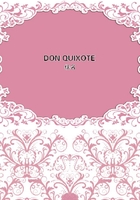
第79章
"It makes it worse to stir it, friend Sancho," returned Don Quixote.
With this and other talk of the same sort master and man passed the night, till Sancho, perceiving that daybreak was coming on apace, very cautiously untied Rocinante and tied up his breeches. As soon as Rocinante found himself free, though by nature he was not at all mettlesome, he seemed to feel lively and began pawing- for as to capering, begging his pardon, he knew not what it meant. Don Quixote, then, observing that Rocinante could move, took it as a good sign and a signal that he should attempt the dread adventure.
By this time day had fully broken and everything showed distinctly, and Don Quixote saw that he was among some tall trees, chestnuts, which cast a very deep shade; he perceived likewise that the sound of the strokes did not cease, but could not discover what caused it, and so without any further delay he let Rocinante feel the spur, and once more taking leave of Sancho, he told him to wait for him there three days at most, as he had said before, and if he should not have returned by that time, he might feel sure it had been God's will that he should end his days in that perilous adventure. He again repeated the message and commission with which he was to go on his behalf to his lady Dulcinea, and said he was not to be uneasy as to the payment of his services, for before leaving home he had made his will, in which he would find himself fully recompensed in the matter of wages in due proportion to the time he had served; but if God delivered him safe, sound, and unhurt out of that danger, he might look upon the promised island as much more than certain. Sancho began to weep afresh on again hearing the affecting words of his good master, and resolved to stay with him until the final issue and end of the business. From these tears and this honourable resolve of Sancho Panza's the author of this history infers that he must have been of good birth and at least an old Christian; and the feeling he displayed touched his but not so much as to make him show any weakness; on the contrary, hiding what he felt as well as he could, he began to move towards that quarter whence the sound of the water and of the strokes seemed to come.
Sancho followed him on foot, leading by the halter, as his custom was, his ass, his constant comrade in prosperity or adversity; and advancing some distance through the shady chestnut trees they came upon a little meadow at the foot of some high rocks, down which a mighty rush of water flung itself. At the foot of the rocks were some rudely constructed houses looking more like ruins than houses, from among which came, they perceived, the din and clatter of blows, which still continued without intermission. Rocinante took fright at the noise of the water and of the blows, but quieting him Don Quixote advanced step by step towards the houses, commending himself with all his heart to his lady, imploring her support in that dread pass and enterprise, and on the way commending himself to God, too, not to forget him. Sancho who never quitted his side, stretched his neck as far as he could and peered between the legs of Rocinante to see if he could now discover what it was that caused him such fear and apprehension. They went it might be a hundred paces farther, when on turning a corner the true cause, beyond the possibility of any mistake, of that dread-sounding and to them awe-inspiring noise that had kept them all the night in such fear and perplexity, appeared plain and obvious; and it was (if, reader, thou art not disgusted and disappointed) six fulling hammers which by their alternate strokes made all the din.
When Don Quixote perceived what it was, he was struck dumb and rigid from head to foot. Sancho glanced at him and saw him with his head bent down upon his breast in manifest mortification; and Don Quixote glanced at Sancho and saw him with his cheeks puffed out and his mouth full of laughter, and evidently ready to explode with it, and in spite of his vexation he could not help laughing at the sight of him; and when Sancho saw his master begin he let go so heartily that he had to hold his sides with both hands to keep himself from bursting with laughter. Four times he stopped, and as many times did his laughter break out afresh with the same violence as at first, whereat Don Quixote grew furious, above all when he heard him say mockingly, "Thou must know, friend Sancho, that of Heaven's will I was born in this our iron age to revive in it the golden or age of gold; I am he for whom are reserved perils, mighty achievements, valiant deeds;" and here he went on repeating the words that Don Quixote uttered the first time they heard the awful strokes.